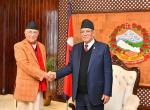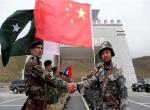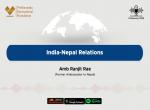Peace with Pakistan is a desirable goal, but peace should be equally desired by both sides and both should contribute to it in equal measure. The burden of making peace should not fall on India while Pakistan retains the freedom to disrupt it at will.
Normalization of India-Pakistan relations should not be predicated on demands by Pakistan and concessions by India. Historically, Pakistan is not a victim of India’s war-mongering; it is India that has suffered Pakistani military aggression and jihadi terrorism. Pakistan is more obliged to convince India of its peaceful intentions rather than the reverse.
Claims
The notion that India as the bigger and stronger country has to be generous with Pakistan is egregious. If this principle should dictate the conduct of international relations then China should be generous towards India on issues that divide us- which it decidedly is not- and the US, as the world’s most powerful country, should be making concessions to virtually all others- which it decidedly does not do.
Once again we hear talk about culling the low hanging fruit of Siachen in order to politically enable the Prime Minister to visit Pakistan towards the year end. This agreement will supposedly provide the required substantive outcome that can be jointly celebrated. Why India must make a territorial concession to make its own PM’s visit possible and Pakistan need not act on terrorism is not explained.
Those who advocate withdrawal from Siachen- or more appropriately Saltoro as Siachen lies to its east- need to clarify whether we are occupying Pakistani territory. If we are, withdrawal could be mooted. If we are not, then why should we withdraw from our own territory simply because Pakistan contests India’s sovereignty over this part of J&K and insists we accept its position. Should such obduracy inspire trust in its intentions?
The 1949 and the 1972 agreements delineate the LOC till NJ9842, with the line going “northwards towards the glaciers” beyond that. “Northwards” cannot in any linguistic or geographical interpretation mean “north-eastwards”, but Pakistan and the US unilaterally drew the line several decades ago from NJ9842 north-eastwards to the Karakoram pass controlled by the Chinese.
In reality, because the entire state of J&K acceded to India legally, the areas not in control of Pakistan are rightfully Indian whether we physically occupy every inch of our own territory or not. We were compelled to occupy the Saltoro Ridge to prevent Pakistan (under a certain Brigadier Musharraf) from occupying it and threatening our hold over the Shyok valley and potentially Ladakh itself. Why should Pakistan have wanted to occupy these punishing heights if they have no strategic value?
Saltoro need not have “strategic” value if our borders with both Pakistan and China were demarcated, neither had any claim to our territory and relations with both were normal and friendly. It is because this is not the case that we are being compelled to position ourselves the closest possible to the source of the threats. Why withdraw to positions easier to hold physically and lose available defence depth? Should the army brass take decisions on these questions or the civilian authority?
Siachen is the Pakistan army’s agenda. General Musharraf admitted that Kargil was Pakistan’s riposte to Siachen. The argument that an Indian concession on Siachen will strengthen the hands of Pakistan’s civilian government in its peace efforts is dubious as we are being asked to appease the Pakistan army for failing to dislodge us from Saltoro. How will placating it strengthen the army’s disposition towards India and the civilian authority in Pakistan itself?
If prior to Kargil India was disposed to end the Saltoro stand-off by experimenting with Pakistan’s trustworthiness, with reducing the human cost of occupying such forbidding heights as additional reason, after Kargil India has strong reason to be deeply distrustful of Pakistani intentions.
Context
What is the guarantee that safeguards built into any agreement will not be violated by Pakistan at an opportune time, as happened at Kargil? Meanwhile, with technical and infrasrtuctural improvements the human cost has come down drastically. What is the compulsion to place faith in an adversary that still fails to address India’s key concerns?
The jihadi groups in Pakistan still exist; Hafiz Saeed is not being curbed; those responsible for Mumbai have not been tried even after four years and to Kashmir has now been added the emotive issue of water. Pakistani defiance of the US on the issue of terrorism and truck with Islamic extremists has a lesson for India. Pakistan’s Afghan ambitions remain problematic for the region. Any concession on Saltoro should has to be assessed in this larger, unsettled context.
Course
Pakistan’s movement on the trade issue is to be welcomed. In response, even without receiving MFN status yet, India has already commmitted itself to MFN plus treatment for Pakistan and permitting Pakistani investment in India without reciprocal action by Pakistan. There is no case for rewarding Pakistan also on military-security issues in addition
What happens if just before PM’s visit to Pakistan to sign the Saltoro agreement there is a major terror attack in India? Will we postpone the visit? If this happens just after the visit and the agreement, will we freeze its implementation? What will that say of our political judgment? Terrorism remains the most critical issue.
Ideally, Saltoro should be part of an overall settlement of the J&K issue. As a first step, before any evenly balanced demilitarization eventually takes place as a CBM, the LOC should be jointly demarcated beyond NJ9842 along the Actual Ground Position Line, which we now seem to be demanding in what General Kayani sees as a hardening of our posture.
Published in Mail Today 8th May 2012









Post new comment